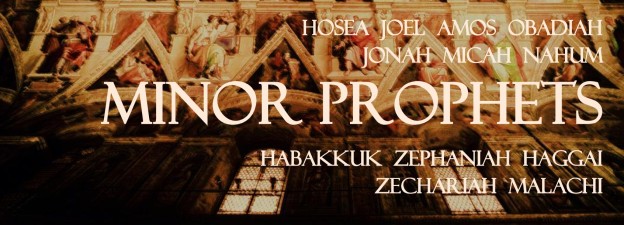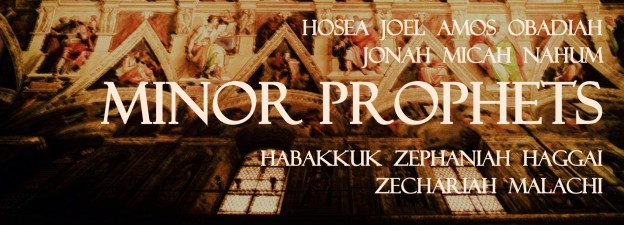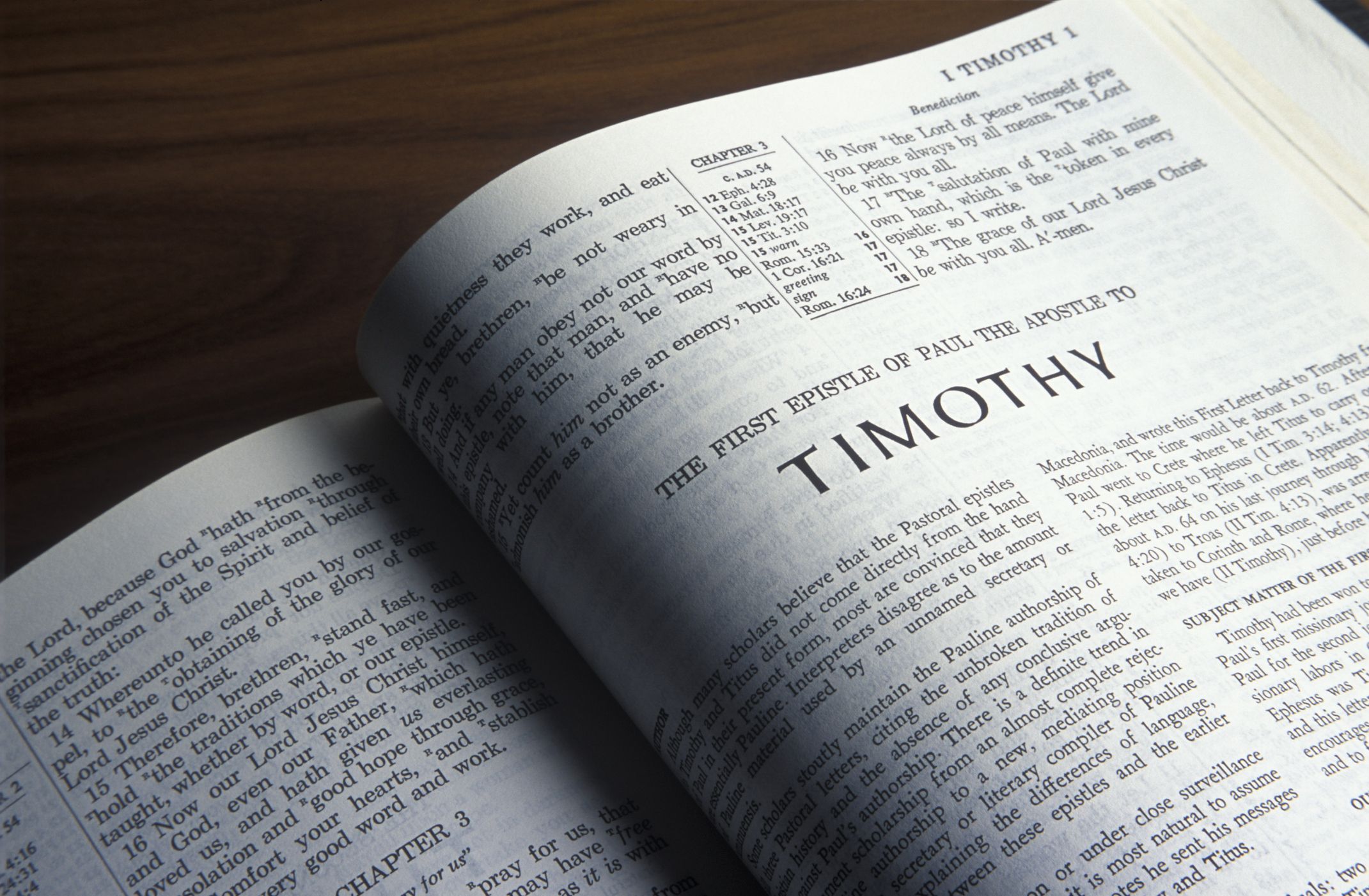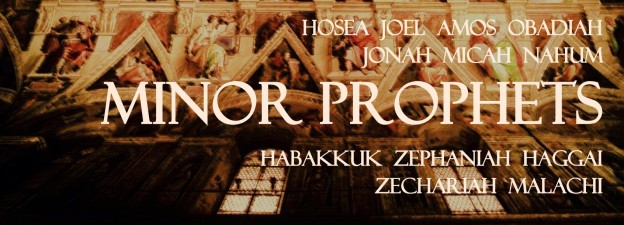"Teach and Urge These Things" -- 1 Timothy 5:1-6:2
 Sunday, June 16, 2019 at 03:17PM
Sunday, June 16, 2019 at 03:17PM 
Here's the audio from this morning's sermon: Click Here
Living in Light of Two Ages
____________________________
 Sunday, June 16, 2019 at 03:17PM
Sunday, June 16, 2019 at 03:17PM 
Here's the audio from this morning's sermon: Click Here
 Wednesday, June 12, 2019 at 01:20PM
Wednesday, June 12, 2019 at 01:20PM 
Sermons on the Minor Prophets: Hosea (3)
YHWH has divorced Israel. The name YHWH gives to Gomer’s third child in Hosea 1:9, is Lo-Ammi. The boy’s name means “not my people.” His name functions as YHWH’s symbolic declaration regarding Israel’s present standing in relationship to the Sinai covenant: cut-off, the covenant rendered null and void. Yet in the very next verse of Hosea (1:10), YHWH announces that Israel will again be “children of the living God.” A dramatic reversal in Israel’s standing occurs as the covenant curse–YHWH’s divorce of Israel–becomes the basis for a future reunion of Israel (both kingdoms). YHWH will again pronounce the covenant promise, “I will be your God and you will be my people.” Those named “no mercy” in the days of Hosea, will be those “who have received mercy,” in the latter days–a people who will seek God, and be restored to the House of David. In this dramatic reversal of divine verdicts, Hosea gives us a lesson in covenant theology, while at the same time pointing us ahead to the messianic age and the coming of Jesus.
This raises the question, how do we go from a rather shocking divine decree of judgment (Lo Ruhmah – “no mercy”) and divorce (Lo-Ammi – “not my people”) to a promise of future redemption from sin and the reconciliation of a divided people? This complete reversal of fortune makes perfect sense against the backdrop of the broad panorama of redemptive history–which is the history of the administration of various biblical covenants, as we have seen throughout our time in the Minor Prophets so far.
There are three covenants revealed to us in the Old Testament. The first is the covenant of works (creation) which YHWH made with Adam in Eden–Adam representing entire human race. Upon condition of perfect personal obedience to YHWH’s commands–“do not eat from this tree”–Adam would have been confirmed in righteousness, and then glorified so as to enter eternal life. But when Adam rebelled against God and sinned, the entire human race (all those represented by Adam) was plunged into the curse of that covenant, sin and death. Hosea will refer to this event in chapter 6:7. The covenant of works demands perfect obedience and issues in death if there is not. It is universal and still in effect today as evidenced by Forest Lawn. We die because of human sin, not because we were designed with a short shelf-life. We die because in Adam, we sinned and are guilty for his act of rebellion (original sin).
The second covenant found in the Old Testament is the covenant of grace, which God establishes immediately after Adam’s Fall. This covenant is not universal, as is the covenant of works. The covenant of grace is made with God’s elect–those who are in Christ. In Genesis 3:15 shortly after Adam sinned, we read the first promise of the gospel. “I will put enmity between you and the woman, and between your offspring and her offspring; he shall bruise your head, and you shall bruise his heel.” This is a prophecy of the coming of Jesus Christ, whose death upon the cross (the bruising of his heel) crushes the head of the serpent (Satan). This covenant is in view in Genesis 17 when God promises Abraham, “I will be your God, and you and your offspring will be my people.” It is reaffirmed a number of times throughout the Old Testament and comes into its fullness in the New Testament as the “new covenant,” ratified through the shed blood of Jesus (as seen in the words of institution of the Lord’s Supper).
Under the covenant of grace, God promises to freely give those who trust his promise, exactly what he demands of us under the covenant of works–a full and perfect payment for the guilt of sin, and perfect obedience to his commandments–a justifying righteousness. In the new covenant, this comes through faith in the person and work of Jesus (the condition of this covenant). This covenant of grace was promised to Adam, ratified with Abraham, reaffirmed to David (specifically the promise of a Messiah, who possesses an everlasting kingdom) and then foretold in the prophets (especially Jeremiah 31:31-34, which foretells of a new covenant). The covenant of grace is grounded in God’s promise to justify all those who renounce their own righteousness and seek Christ’s through faith.
To read the rest of this sermon: Click Here
 Monday, June 10, 2019 at 10:49AM
Monday, June 10, 2019 at 10:49AM 
Sunday Morning, June 16: Paul sees the church as the "household of God." How should we treat others within that household, who likewise have been redeemed by Jesus, the head of the house? Our text is 1 Timothy 5:1-6:2 Our worship service begins at 10:30 a.m.
Adult Sunday School: This coming Sunday, I will be discussing the covenant of grace, one of the key features of Reformed theology. We will talk about the biblical basis for such a covenant, along with the nature and conditions of this covenant which lay at the heart of the gospel. Our class begins at 9:00 a.m.
Afternoon: We are still discussing Lord's Day 6 of the Heidelberg Catechism. We are focusing upon the catechism's discussion of promise and fulfillment in question 19. Our afternoon service begins at 1:15 p.m.
Wednesday Night Bible Study: On Hiatus Until Fall 2019
Friday Night Academy: On Hiatus Until Fall of 2019
For more information on Christ Reformed Church you can always find us here Christ Reformed Church, or Christ Reformed on Facebook.
 Sunday, June 9, 2019 at 03:26PM
Sunday, June 9, 2019 at 03:26PM 
Here's the audio from this mornings's sermon on 1 Timothy 4:6-16: Train Yourself for Godliness
 Wednesday, June 5, 2019 at 10:16AM
Wednesday, June 5, 2019 at 10:16AM 
Sermons on the Minor Prophets: Hosea (2)
If anyone present desires to be a prophet, I would simply ask you to consider the prophetic call of Hosea: “Hosea, go and marry a prostitute, have a child with her, then willingly accept her back after she abandons you and becomes destitute, and then accept her other children who may not (likely) be yours.” This should quickly disabuse you of the idea that it might be “cool” to be a prophet. YHWH called Hosea to replicate YHWH’s own relationship to Israel so as to make a larger theological point illustrated by the life of Gomer. YHWH’s covenant people (Israel) repeatedly abandoned him for other lovers, and bore spiritual children who were far more pagan than faithful members of YHWH’s covenant community. Because YHWH is gracious and always keeps his covenant promises, he will restore Israel. But not before the covenant curses fall upon the people and the nation in the form of an Assyrian invasion.
We are continuing our series on the Book of Hosea–one the most difficult books found among the Twelve (the Minor Prophets). Last time, we asked and answered the four questions (“Who?” “When?” “Why?” and “What?”) which enable us to establish a context from which to properly interpret, and then apply the message of Hosea. We will work our way through the opening section of Hosea’s prophecy–vv. 2-9, in which YHWH commands his prophet, Hosea, to marry Gomer, a woman of questionable reputation. In this section, we also discover that Gomer bore three children, Jezreel, Lo-Ruhamah, and Lo-Ammi. These children (especially the meaning of their names) will symbolically tell us the story of Israel’s fate throughout the balance of the prophecy. While we begin by focusing upon the account of Hosea and Gomer–establishing Israel’s spiritual adultery as the main theme of the prophecy, we also discover that Gomer’s children play a major role in our interpretation of Hosea’s prophecy.
Keeping the big picture before us is important as we go through this book–especially chapters 4-14. Hosea will marry Gomer as YHWH commands, but Gomer will leave Hosea for other lovers and even perhaps bear their children. Gomer will become destitute and eventually become a slave. Remarkably, Hosea will purchase her back–in effect, redeeming her. In this enacted parable, we see the story behind the story–Israel has abandoned YHWH and for all intents and purposes has become the husband of Baal. Failing to repent, Israel was facing the curses associated with the covenant YHWH made with them at Mount Sinai. The final and ultimate covenant curse comes upon Israel shortly after Hosea completes his prophecy about 725 B.C. in the form of the Assyrian invasion, in which the last of Israel’s provinces (Samaria) finally falls to King Sargon II in 722 B.C. Israel must die before YHWH will restore true Israel at the dawn of the messianic age. But restoration will come. YHWH always keeps his promises.
Hosea presents us with a significant theological problem from the second verse. Why would God command that his chosen prophet marry someone described as a whore? Gomer is a promiscuous woman, who may even be a prostitute–this is certainly implied. This raises the question, “is YHWH’s command to Hosea merely part of a parable–a fictional story designed to make a larger theological point?” Or did YHWH actually command this of his prophet Hosea? And if so, why?
There have been many attempts to solve this supposed dilemma. A number of commentators avoid the issues this passage presents by contending that YHWH’s command to Hosea is an allegory or fictional parable without any historical basis. Critical scholars often have as their default setting the view that anything miraculous, or problematic in the text is dismissed out of hand as fiction or myth. For these interpreters, this is merely a parable which makes the point that Israel was engaged in spiritual adultery. But even John Calvin was so troubled by this comma prophetic office and end up a poor witness to Israel of YHWH’s righteousness. Calvin thought YHWH would never ask such a thing of his servant, so the first three chapters of Hosea, he feels, must be a vision in which YHWH is speaking to Hosea in hypothetical terms; “suppose I had a wife named Gomer, and she did this to me.” Calvin thought this was done by Hosea so as to make a graphic point about the gravity of Israel’s spiritual adultery.
To read the rest of this sermon: Click Here
 Monday, June 3, 2019 at 10:27AM
Monday, June 3, 2019 at 10:27AM 
Sunday Morning, June 9: We are discussing Paul's instructions to Timothy about training in godliness. What does that entail and how does one do it? Our text is 1 Timothy 4:6-16. Our worship service begins at 10:30 a.m.
Adult Sunday School: For the next two Sundays (June 9, 16), I will be discussing the covenant of grace, one of the key features of Reformed theology. We will talk about the biblical basis for such a covenant, along with the nature and conditions of this covenant which lay at the heart of the gospel. Our Sunday begins at 9:00 a.m.
Afternoon: We are discussing Lord's Day 6 of the Heidelberg Catechism. We are focusing upon the catechism's assertion that the mediator must be truly God. Our afternoon service begins at 1:15 p.m.
Wednesday Night Bible Study: On Hiatus Until Fall 2019
Friday Night Academy: On Hiatus Until Fall of 2019
For more information on Christ Reformed Church you can always find us here Christ Reformed Church, or Christ Reformed on Facebook.
 Sunday, June 2, 2019 at 03:16PM
Sunday, June 2, 2019 at 03:16PM 
Here's the audio from this morning's sermon 1 Timothy 3:14-5:4: Click Here
 Friday, May 31, 2019 at 08:49AM
Friday, May 31, 2019 at 08:49AM 
Here's the audio from the Wednesday night Bible study:
 Tuesday, May 28, 2019 at 09:24AM
Tuesday, May 28, 2019 at 09:24AM 
Sermons on the Minor Prophets: Hosea (1)
Now for something completely different–the Prophecy of Hosea. Hosea has been described as the “death-bed prophet of Israel.” This is because he is the last of YHWH’s prophets sent to the Northern Kingdom of Israel, before that kingdom was conquered by Assyria in 722 B.C. Hosea was present throughout the tumultuous and tragic days of Israel’s fall. His prophecy opens with YHWH’s command to marry a prostitute because this act mirrors YHWH’s covenantal relationship to his people, Israel. Hosea will play the role to this woman that YHWH has played to Israel–a faithful husband to an unfaithful spouse. Israel’s apostasy–seen in the idol worship rampant throughout the land–is like that of promiscuous wife who repeatedly breaks her martial vows by cheating on her husband and bearing the children of her lovers. Hosea’s wife Gomer, is a graphic and tragic mirror image of Israel’s chief institutions–the kings, the priests, and the religious life of the nation. Despite Israel’s on-going and deepening apostasy, repeatedly, Hosea pushes us to see that even Israel’s sin cannot nullify YHWH’s gracious covenant promises. Right up to the end (in fact, even beyond), YHWH always stands willing to forgive and restore a repentant people who heed his call to return to him in faith and obedience.
We have completed our study of Amos–a prophet from Judah called to proclaim YHWH’s covenant lawsuit to Israel, the breakaway and short-lived Northen Kingdom. We have also completed our study of the Book of Jonah, who was a loyal Israelite, called by God to preach the word of YHWH to the city of Nineveh, in the very heart of Assyria, Israel’s mighty enemy to the north. This morning we begin our study of the prophet Hosea, who unlike Amos was an Israelite, and whose prophetic ministry overlaps that of Amos. But the Book of Hosea is very different than the Book of Amos. Hosea is the first book found in the Hebrew Minor Prophets–the Twelve–and takes on a form unique to the Minor Prophets. A book without a clear outline, Hosea’s prophecy opens with an enacted parable (chapters 1-3), before giving the reader a series of warnings, laments, poems, and sermons (chapters 4-14). Hosea is, as one commentator tells us, “a difficult book, [yet] also a great book.” He adds:
[Hosea] is like a tree whose roots go down deep into the Torah and whose branches bear the fruit of a discourse that became the grammar of biblical prophecy. Many of the themes, and much of the vocabulary, of the great literary prophecies of Isaiah, Jeremiah, and Ezekiel originate in Hosea. It also is a book that jolts the reader; it refuses to be domesticated and made conventional. It does comfort the afflicted, but it most surely afflicts the comfortable. It is as startling in its presentation of sin as it is surprising in its stubborn certainty of grace. It is as blunt as it is enigmatic. It is a book to be experienced, and the experience is with God.
We are in for a difficult but rewarding study in the weeks ahead.
As we have seen throughout our time in the Minor Prophets, whenever we take up the various books included in The Twelve, it is vital that we ask and answer a series of questions, “Who?” “When?” “Why?” and “What?” so as to consider the Minor Prophets in their historical context. It is necessary that we understand their message to their original audience, so that we can draw proper application. That context is distinctively covenantal. That is, these were prophecies given to people living under the covenant God made with Israel at Mount Sinai through the mediation of Moses. It is wrong–and unfortunately, an all too common error–to ignore that context and lift passages from these prophets and apply them directly to specific contemporary cultural or political situations.
To read the rest of this sermon: Click Here
 Monday, May 27, 2019 at 09:53AM
Monday, May 27, 2019 at 09:53AM 
Sunday Morning, June 2: Paul warns Timothy of the perils of the last days while encouraging the young pastor to reflect upon the mystery of Godliness. Our passage this coming Lord's Day is 1 Timothy 3:14-4:5. Our worship service begins at 10:30 a.m.
Adult Sunday School (9:00 a.m.): For the next three Sundays (June 2, 9, 16), I will be discussing the covenant of grace, one of the key features of Reformed theology. We will talk about the biblical basis for such a covenant, along with the nature and conditions of this covenant which lay at the heart of the gospel.
Afternoon: We are discussing Christ's role as mediator from Lord's Day 6 of the Heidelberg Catechism. Our afternoon service begins at 1:15 p.m.
Wednesday Night Bible Study: (May 29 @ 7:30 p.m.). We come to the final plank in our case for Christianity. What does Scripture say about itself?
Friday Night Academy: (Friday, May 31 @ 7:30 p.m.). We are discussing Michael Horton's theology text, The Christian Faith. We are in chapter thirteen, "The Fall of Humanity" (p. 423).
For more information on Christ Reformed Church you can always find us here Christ Reformed Church, or Christ Reformed on Facebook.